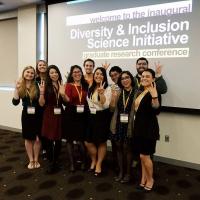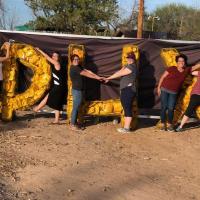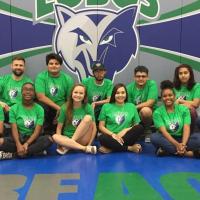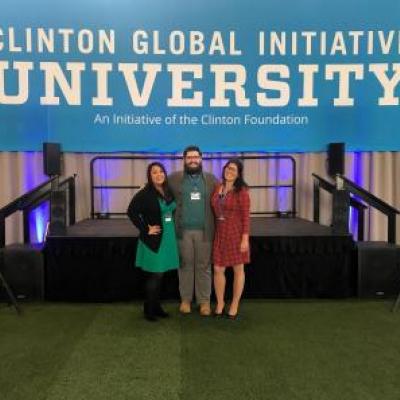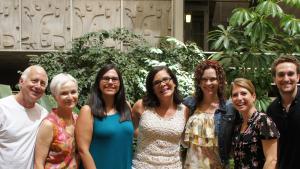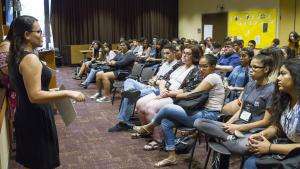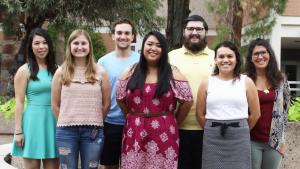Events
2018 Diversity and Inclusion Science Initiative Graduate Research ConferenceT. Denny Sanford School of Social and Family Dynamic (The Sanford School) doctoral students hosted the inaugural DISI Graduate Research Conference designed to showcase how the work of ASU graduate students from all disciplines advances diversity and inclusion efforts. The conference was sponsored by The Sanford School and focused on three major themes: conducting research that defines and/or promotes diversity and inclusion, incorporating diversity and inclusion into teaching and mentoring, and navigating personal identities within institutions. The conference featured two keynote speakers, Dr. Vivian Tseng, Senior Vice President for Programs at the William T. Grant Foundation and Dr. Robert Sellers, Professor of Psychology and Education, Vice Provost for Equity and Inclusion, and Chief Diversity Officer at the University of Michigan. Graduate students also had the opportunity to participate in round tables with local non-profit organizations in the Phoenix metro area, as well as volunteering at three non-profit sites. | |
Invited Talk: Double Check: A Model for Promoting Cultural Responsiveness & Equitable Practices in SchoolsDr. Katrina Debnam, Assistant Professor of School of Nursing and Curry School of Education at the University of Virginia Research consistently finds that students of color are overrepresented in office disciplinary referrals, suspensions, and special education referrals (Bradshaw et al., 2010; Krezmien et al., 2006; Skiba et al., 2002). Few research-based programs have been developed and rigorously tested to determine their impact on reducing disparities in student discipline problems and academic engagement (Bottiani et al., 2017). To fill this gap, we have developed an innovative data-driven coaching and professional development model called Double Check (Hershfeldt et al., 2009; Rosenberg, 2007) which promotes data-based decision-making, professional development on culturally responsive practices, and coaching in culturally sensitive classroom management and student engagement strategies. The intervention is delivered through a school-wide positive behavior support framework, professional development workshops as well as tailored coaching with teachers, using an adapted version of the Classroom Check-up (Reinke, 2007). Dr. Debnam presented an overview of the Double Check model and findings from a randomized controlled trial (RCT) of Double Check in 18 elementary and middle schools. | |
The Better Together ChallengeThe Better Together Challenge was developed by the T. Denny Sanford School of Social and Family Dynamics as part of its signature Diversity and Inclusion Science Initiative (DISI) to work in partnership with middle and high schools to support students' success. In total, eleven schools submitted project proposals that promoted school environments that are safe, inclusive, and equitable for all students. Five schools were selected as finalists, receiving $300 in funds to implement their project with the guidance of project advisors. This year, Compadre Academy received the Top Project Award, winning $500 in funds to continue to implement their project during the 2018-2019 academic year. In the news: Compadre Academy wins ASU's Better Together Challenge |
Invited Talk: Corporal Punishment in U.S. Public Schools: Using Research to End Legal Violence against Children
Dr. Elizabeth Gershoff, Associate Professor of Human Development and Family Science at the University of Texas at Austin
Corporal punishment is legal in public schools in 19 U.S. states. In this talk, Dr. Gershoff presented data on disparities in use of corporal punishment by gender, race, and disability status and reviewed the known effects of corporal punishment on children. She discussed her involvement in efforts to prohibit school corporal punishment both in the U.S. and around the world.
Workshop: Excellence: Developing Effective Practices for Inclusive Classrooms
Dr. Chavella T. Pittman, Associate Professor of Sociology at the Dominican University
This workshop highlighted the basic components of inclusive teaching, which is important to the retention and success of diverse students and furthers the learning of all students. The workshop detailed ways in which faculty can start to improve the inclusivity of their teaching methods by (1) introducing the four components of inclusive pedagogy, (2) including hands-on and interactive work for one of these components, and (3) suggesting next steps for furthering inclusive pedagogy.
2017 Clinton Global Initiative UniversityThe Clinton Global Initiative University selected students Larissa Gaias, Michelle Pasco, and Chanler Hilley to attend its 2017 session at Northeastern University in Boston, Massachusetts, on October 13–15, 2017. Along with three other Sanford School doctoral students, these students presented their Commitment to Action: planning and executing the inaugural DISI Graduate Research Conference regarding diversity and inclusion at ASU, to take place February 1–2, 2018. The students also received a Graduate and Professional Student Association group traveling grant award to attend the conference. |
DISI Multi-Layered Training Programs
To build a higher education pipeline for underrepresented students, the DISI developed a multi-layered training program. Researcher collaborators conduct interdisciplinary research designed to foster knowledge that reflects the strengths and assets that result from contact with diverse groups. The 2017–2018 Research Fellows are as follows:
Undergraduate Fellows
- Eduardo Contreras
- Kandice D. Marrero
Graduate Fellows
- Abigail Gabriel
- Xiaoye Xu
Postdoctoral Research Associates
- Dr. Cassandra Cotton
- Dr. Jenny Padilla
- Dr. Megan Costa
Research-Focused Orientation for Transfer Students
The primary goal of this research-focused orientation was to introduce and welcome Sanford School transfer students. Students had the opportunity to meet with academic advisors and learned about available resources at ASU. An important part of this orientation was to introduce students to research opportunities within the Sanford School. The orientation also included a research panel with the Sanford School faculty and graduate students.
Puerto Rico Doctoral Visiting Students
The DISI hosted Ariadna Aldarondo and Yaddira Molano—Clinical Psychologist (Psy.D.) students from Albizu University, Puerto Rico campus—for a summer research internship. Both students participated in research projects with Sanford School faculty: Drs. Carol Martin, Laura Hanish, Dawn Delay, and Tracy Spinrad.
The PROMISE Project Retreat
The goal of the PROMISE Project is to promote inclusive and safe environments in and outside of schools. PROMISE team members Cindy Faith Miller, Richard Fabes, Carol Lynn Martin, Laura Hanish, Anissa Rasheta, Arlyn Moreno, Janna Juvonen (UCLA), and Christia Spears Brown (University of Kentucky) participated in a one-day retreat to catalyze this exciting new initiative. The retreat enabled team members to outline the project’s mission and vision, develop goals and plans, and identify strategies for developing partnerships with community members.
Cesar E. Chavez Leadership Institute
The Cesar E. Chavez Leadership Institute is a one-week residential camp for high school seniors and juniors that focuses on leadership, education, and community and civic engagement. Established in 1995, the program originally offered leadership opportunities for Latino students contemplating college at a time when few such options existed. In 2011, the program opened to students from all backgrounds. At the 2017 summer institute, Larissa Gaias, Michelle Pasco, and Arlyn Moreno Luna offered a workshop on diversity and inclusion to 60 teens with diverse mix of ethnic backgrounds and socio-economic levels from around Arizona. Students defined diversity, inclusion, and equity in small groups and participated in “Circles of My Multicultural Self,” which helps participants identify what they consider the most important dimensions of their own identity.
The Hope Project Retreat
Dr. Kristina Schmid Callina, Research Assistant Professor of the Institute for Applied Research in Youth Development at Tufts University
As part of the DISI, the Sanford School is collaborating with Kids at Hope to form a new center at ASU: the Center for the Advanced Study and Practice of Hope. The Center’s mission will be to explore the basic and applied science of hope and its relation to positive youth and community development. Team members participated in a full-day retreat led by Dr. Kristina Schmid Callina to learn more about the current state of hope-related research and areas of investigation needed to advance the field.
Kids at Hope, 2017 Youth Development Master’s Institute
Committee members from the Hope Project (Tashia Abry, Casey Sechler, Crystal Bryce, Manuela Jimenez, Brittany Alexander, and Arlyn Moreno Luna) attended the 2017 Youth Development Master’s Institute. Erin Gruwell, inspiration for the film Freedom Writers, served as the Honorary Dean and Keynote Speaker. In addition, Dr. Richard Fabes gave a Hope2 Talk: “Breaking Down Barriers to Hope in a Diverse World.”
Presentation: Culture and the Development of Intergroup Gender Attitudes
Dr. May Ling Halim, Assistant Professor of Psychology at the California State University Long Beach
Gender inequality persists globally, driven by historical and current gender intergroup attitudes and stereotypes that devalue or differentiate individuals based on gender. Dr. Halim presented results from three studies based on ethnically diverse communities across New York, Arizona, and California. In the first, she focused on normative social cognitive developments, such as the emergence of gender identity, as possible contributors to biased gender attitudes in early childhood. Dr. Halim summarized research finding ethnic variation in gender attitudes among 5- to 11-year-olds across sites. Next, she examined whether family socialization influences emerging adults’ gender attitudes. Lastly, Dr. Halim offered possible solutions to improve children’s gender attitudes and relationships based on these findings.
Invited Talk: Social Identities and Cultural Narratives: Exploring the Meaning of Racial and Gender Identity in Middle Childhood
Dr. Onnie Rogers, Assistant Professor of Psychology at the Northwestern University
Dr. Rogers presented findings on the relative importance and meaning of race and gender during middle childhood and discussed preliminary findings from a qualitative analysis of their racial and gender narratives. Data gathered from Black, White, and Mixed-Race children in racially diverse public schools explored children’s interpretations of their racial and gender identities. Dr. Rogers discussed group- and age-related differences and proposed that children, like adolescents, negotiate their social identities in response to broader cultural narratives about their social groups.
Focus Groups: ASU Graduate Students
Doctoral students in Family and Human Development conducted focus groups with graduate students from a variety of academic disciplines with the goal of learning about graduate students’ understanding of diversity and inclusion in the context of a large research university, as well as learning about graduate students’ experiences navigating their identities in academia. Ultimately, the outcomes factored into the planning for the first DISI Graduate Research Conference.
Invited Talk: Inclusion and Diversity: A Conversation about Science and Practice
Dr. Cynthia Garcia Coll, Associate Director of Institutional Center of Scientific Research at Albizu University
Developmental and social scientists have established how early and pervasive out-group biases are established. Some of these processes start on the first year of life and solidly established by the preschool years. Dr. Garcia Coll discussed the ways in which we can work towards inclusion and acceptance of cultural/racial/ethnic/religious/socioeconomic/sexual orientation differences in educational settings while recognizing how early prejudices in these areas are established.
Invited Talk: Diversity, Context and the Promotion of Positive Development among Youth: A Relational Development Systems-Based Approach
Dr. Richard M. Lerner, Bergstrom Chair in Applied Developmental Science Institute for Applied Research in Youth Development, Tufts University
How can developmental scientists, youth development practitioners, and policy professionals use theory and research to improve the lives of the diverse youth, families, and communities they seek to understand and to serve? In contemporary developmental science, a philosophical orientation—termed relational developmental systems (RDS) metatheory—serves as the cutting-edge frame for theoretical models of development. Dr. Lerner discussed the philosophical foundations of RDS metatheory, explained the ideas of relative plasticity and individual agency in RDS-based models, and illustrated the use of RDS-based ideas for understanding the contributions of biology, including evolutionary biology and epigenetics, to the development of individuals across the life span. Dr. Lerner argued that RDS-based theory and research elevate social justice as a superordinate lens for judging the success of developmental science to enhance thriving among the diverse youth, families, and communities of our nation and world.
Invited Talk: When Sex and Gender Collide: The TransYouth Project
Dr. Kristina Olson, Director of the TransYouth Project, Associate Professor of Psychology at the University of Washington
While the study of how we come to understand our own gender and the influence gender has on our lives has been central to the study of human psychology for decades, nearly all research to date has focused on people who experience “typical” gender identity (gender identity that aligns with one's sex). In this talk, Dr. Olson talked about her recent work exploring gender representation, gender development, and mental health in an increasingly visible group of children—transgender youth—for whom gender and sex collide. She discussed how her findings influence existing conceptualizations of childhood gender development as well as larger political discussions concerning transgender youth.

